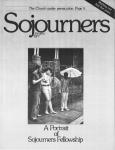Repression of progressive elements of the church has escalated dramatically in certain Latin American countries during the past months.
Roman Catholic Bishop Leonidas Proano Villalba of Riobamba, Ecuador, was arrested with 48 other clergy last August in the Ecuadorian government’s raid on a pastoral conference attended by Latin American and U.S. bishops. Bishop Proano publicly interpreted the unprecedented raid as an extension of police violence issuing from Bolivia.
While the other bishops, including four from the U.S., were held incommunicado for more than 24 hours at a military barracks, Proano was interrogated. Archbishop Robert Sanchez of Santa Fe, N.M., one of the four U.S. bishops detained, believed the arrests were an attempt to discredit Bishop Proano.
After being returned to Riobamba, Proano told a cheering crowd of poor farmers and workers: “In those papers (confiscated by the police) the government will find an analysis of reality and of the pastoral experience of bishops. But the truly subversive document, which the police did not take, is the gospels.”
Proano’s charge, that his arrest was part of a strategy developed in Bolivia by General Hugo Banzer, was leveled soon after his release from jail, and widely reported in the Ecuadorian press.
The “Banzer Plan” was first reported last year by Latinamerica Press of Lima, Peru, which received the information from church sources who claimed that a Bolivian police official supplied it to them. The unnamed official spelled out 15 directives to be followed by the Bolivian police, including:
• “Only the church’s progressive sector is to be attacked, not the church as an institution nor the bishops as a group.”
• “The foreign clergy especially is to be attacked.”
• “The CIA promised to reveal full information on certain priests, especially those from the United States.”
• “Arrests should be made preferably in the countryside, on deserted streets, or at night.”
Not all arrested with Proano agreed that the raid was part of a continent-wide strategy, but all agreed that repression is on the upswing in Latin America. As portions of the church oppose the policies of various dictatorial governments, they feel the apparatus of repression levied against them.
In Argentina seven priests and two seminarians have been assassinated in recent months, while one bishop was killed in an auto accident considered suspicious by the church. The murders have been attributed to right-wing vigilante death squads. In Argentina rightist terrorism is often conducted with the protection of higher authorities and, at times; by off-duty policemen.
Patricia Erb, the 19 year old daughter of Mennonite missionaries in Buenos Aires, was deported to the United States on October 5 after being abducted at gunpoint by Argentina’s secret police September 13. Erb and other young people had been a part of a university leftist organization, but were presently seeking ways to work at social problems through their local congregations and an interdenominational group. They had severed their connections with the political group six weeks prior to her kidnapping.
At the Disciples of Christ 40-member Administrative Committee held in November, concern was expressed for Claudia Piero, 18, the daughter of a Disciples minister in Argentina, who has been in jail for six months without being formally charged. Her parents visited her after her arrest on May 17 but have not seen her since. While Claudia’s mother is still in Argentina, her father went to Guatemala after his life was threatened.
In Brazil, the world’s most populous Catholic country, church-state relations have continued to deteriorate. A forceful statement of the National Conference of Brazilian Bishops recently accused the government of “reducing the people to silence” and placing “state security above individual security.”
Police-linked “death squads” have been sympathetic to big land developers who have been throwing peasant farmers off their small plots and invading Indian lands.
Jesuit Priest Father Juan Bosco Penido Burnier was long a friend of Indians in Western Brazil. He was fatally shot in the head on October 11 when he went to the jail in the village of Ribeirao Bonito to protest the torturing of two Indian women.
In contrast to the usual complacency of the Brazilian government, seven police were arrested in connection with this slaying. There was no way, how ever, to cover up the killing of Burnier, who was accompanied to the jail by his cousin, Archbishop Geraldo Marie Penido de Luiz de Flora. Latinamerica Press also claims Burnier was a cousin of three army and air force generals. This incident occurred shortly after the kidnapping and beating of a bishop in Rio de Janeiro. The Brazilian Anti-Communist Alliance claimed credit for both the beating and the killing.
In November the Archbishop was given personal assurances by Brazil’s President General Ernesto Geisel, that the country’s armed forces and police had been forbidden to use torture on political prisoners. According to the prelate, General Geisel insisted that the Ministry of Justice intends to correct the “mistakes” of poorly trained state police. Father Burnier was a victim of one of these mistakes.
Eight days after the Burnier murder, following a funeral mass, crowds of villagers erected a cross in front of the jail where Burnier was murdered and proceeded to dismantle the building stone by stone.
Don Goertzen was on the editorial staff at Sojourners when this article appeared.

Got something to say about what you're reading? We value your feedback!
